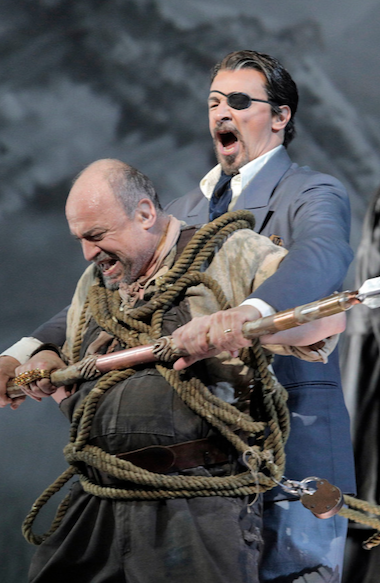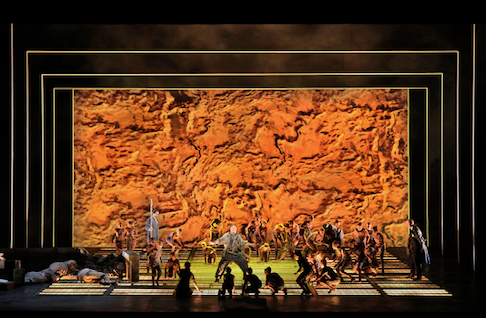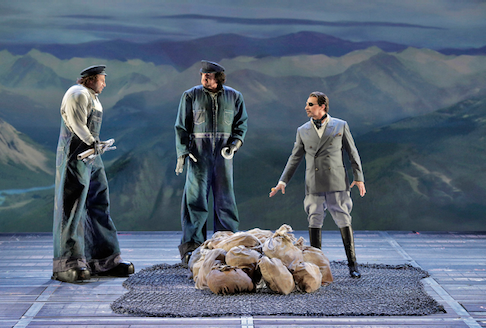
13 Jun 2018
Das Rheingold in San Francisco
Alberich’s ring forged, the gods moved into Valhalla, Loge’s Bic flicked, Wagner’s cumbersome nineteenth century mythology began unfolding last night here in Bayreuth-by-the-Bay.
English Touring Opera are delighted to announce a season of lyric monodramas to tour nationally from October to December. The season features music for solo singer and piano by Argento, Britten, Tippett and Shostakovich with a bold and inventive approach to making opera during social distancing.
This tenth of ten Live from London concerts was in fact a recorded live performance from California. It was no less enjoyable for that, and it was also uplifting to learn that this wasn’t in fact the ‘last’ LfL event that we will be able to enjoy, courtesy of VOCES8 and their fellow vocal ensembles (more below …).
Ever since Wigmore Hall announced their superb series of autumn concerts, all streamed live and available free of charge, I’d been looking forward to this song recital by Ian Bostridge and Imogen Cooper.
The Sixteen continues its exploration of Henry Purcell’s Welcome Songs for Charles II. As with Robert King’s pioneering Purcell series begun over thirty years ago for Hyperion, Harry Christophers is recording two Welcome Songs per disc.
Although Stile Antico’s programme article for their Live from London recital introduced their selection from the many treasures of the English Renaissance in the context of the theological debates and upheavals of the Tudor and Elizabethan years, their performance was more evocative of private chamber music than of public liturgy.
In February this year, Albanian soprano Ermonela Jaho made a highly lauded debut recital at Wigmore Hall - a concert which both celebrated Opera Rara’s 50th anniversary and honoured the career of the Italian soprano Rosina Storchio (1872-1945), the star of verismo who created the title roles in Leoncavallo’s La bohème and Zazà, Mascagni’s Lodoletta and Puccini’s Madama Butterfly.
Evidently, face masks don’t stifle appreciative “Bravo!”s. And, reducing audience numbers doesn’t lower the volume of such acclamations. For, the audience at Wigmore Hall gave soprano Elizabeth Llewellyn and pianist Simon Lepper a greatly deserved warm reception and hearty response following this lunchtime recital of late-Romantic song.
Collapsology. Or, perhaps we should use the French word ‘Collapsologie’ because this is a transdisciplinary idea pretty much advocated by a series of French theorists - and apparently, mostly French theorists. It in essence focuses on the imminent collapse of modern society and all its layers - a series of escalating crises on a global scale: environmental, economic, geopolitical, governmental; the list is extensive.
For this week’s Live from London vocal recital we moved from the home of VOCES8, St Anne and St Agnes in the City of London, to Kings Place, where The Sixteen - who have been associate artists at the venue for some time - presented a programme of music and words bound together by the theme of ‘reflection’.
'Such is your divine Disposation that both you excellently understand, and royally entertaine the Exercise of Musicke.’
Amongst an avalanche of new Mahler recordings appearing at the moment (Das Lied von der Erde seems to be the most favoured, with three) this 1991 Mahler Second from the 2nd Kassel MahlerFest is one of the more interesting releases.
‘And there was war in heaven: Michael and his angels fought against the dragon; and the dragon fought and his angels, And prevailed not; neither was their place found any more in heaven … that old serpent … Satan, which deceiveth the whole world: he was cast out into the earth, and his angels were cast out with him.’
If there is one myth, it seems believed by some people today, that probably needs shattering it is that post-war recordings or performances of Wagner operas were always of exceptional quality. This 1949 Hamburg Tristan und Isolde is one of those recordings - though quite who is to blame for its many problems takes quite some unearthing.
There was never any doubt that the fifth of the twelve Met Stars Live in Concert broadcasts was going to be a palpably intense and vivid event, as well as a musically stunning and theatrically enervating experience.
‘Love’ was the theme for this Live from London performance by Apollo5. Given the complexity and diversity of that human emotion, and Apollo5’s reputation for versatility and diverse repertoire, ranging from Renaissance choral music to jazz, from contemporary classical works to popular song, it was no surprise that their programme spanned 500 years and several musical styles.
The Academy of St Martin in the Fields have titled their autumn series of eight concerts - which are taking place at 5pm and 7.30pm on two Saturdays each month at their home venue in Trafalgar Square, and being filmed for streaming the following Thursday - ‘re:connect’.
The London Symphony Orchestra opened their Autumn 2020 season with a homage to Oliver Knussen, who died at the age of 66 in July 2018. The programme traced a national musical lineage through the twentieth century, from Britten to Knussen, on to Mark-Anthony Turnage, and entwining the LSO and Rattle too.
With the Live from London digital vocal festival entering the second half of the series, the festival’s host, VOCES8, returned to their home at St Annes and St Agnes in the City of London to present a sequence of ‘Choral Dances’ - vocal music inspired by dance, embracing diverse genres from the Renaissance madrigal to swing jazz.
Just a few unison string wriggles from the opening of Mozart’s overture to Le nozze di Figaro are enough to make any opera-lover perch on the edge of their seat, in excited anticipation of the drama in music to come, so there could be no other curtain-raiser for this Gala Concert at the Royal Opera House, the latest instalment from ‘their House’ to ‘our houses’.
"Before the ending of the day, creator of all things, we pray that, with your accustomed mercy, you may watch over us."

Alberich’s ring forged, the gods moved into Valhalla, Loge’s Bic flicked, Wagner’s cumbersome nineteenth century mythology began unfolding last night here in Bayreuth-by-the-Bay.
Ring fever was high in the rather-more-than-usual well-dressed, quite excited crowds (standees three deep) present for the first part of the famous tetralogy of three operas plus satyr play (that’s Das Rheingold).
Though first, Rheingold was the last of the tetralogy composed, thus Wagner had already forged the means to taunt us with the magic fire music that will protect us and finally consume us this Sunday, fire that issued full force from the mighty forces of the superb San Francisco Opera Orchestra of ninety players — curious ears were cocked for four Wagnerian tubas. Conductor Donald Runnicles, of the 2011 San Francisco Ring again sustained a convincing Wagnerian continuum.
 A moment in the Nibelungen workshop
A moment in the Nibelungen workshop
Back in 2008 when Francesca Zambello’s 2006 Rheingold was unveiled here in San Francisco the chorus of anvils (last night six off-site players hammered 15 tuned anvils) was prelude to a surprising, indeed stunning vision of the Nibelungen workshop with its multitude of child workers (this was the Industrial Revolution after all). For many of us this was the third time for this revelation, hopefully it once again thrilled those new to this production.
In pre-opening press events care was taken to stress important modifications to the original production, specifically the recasting of many of the proscenium wide videos that now impose video designer S. Katy Tucker’s take on Richard Wagner’s gloriously imposing soundscapes, beginning with the visual play of vastly magnified water molecules intended to introduce the theme of environmental destruction, an important element of the Zambello production.
As well digital technology in more recent years has added stage floor video and lighting possibilities to scenography. This was present in the checkerboard of video screens that was now the stage floor pavement offering the intrusion of ever greater color interpretation. Perhaps an unintended theme to Mme. Zambello’s production will be the tyranny of technology.
The most significant addition to the production is the splendid cast that was introduced to us last night starting with the elegant and cocky shyster Wotan of bass baritone Greer Grimsley. Mr. Grimsley’s well-focused voice promises us an unusually articulate Wotan who has a lot of tough stuff to come to grips with in the next two operas. Of startling effect was the Alberich of German bass baritone Falk Struckmann in his role debut. Mr. Struckmann, once a formidable Wotan himself, was of well-voiced, sufficiently evil stature to forge an amazing weapon of destruction (the ring) and impose its use (his curse).
Dominating the proceedings was the Loge of Czech tenor Stefan Margita (a veteran of the 2008 production in his role debut) — oh so charming, impertinent, supercilious and oh so profoundly cynical. Mr. Margita’s Rheingold Loge was of masterpiece status.
 Fafner, Fasolt and Wotan
Fafner, Fasolt and Wotan
The Zambello Rheingold coup de théâtre is of course the builders of Valhalla, the giants (literally) Fasolt and Fafner. Fasolt, sung by baritone Raymond Aceto (tonight’s Hunding) is smoother and a bit smarter than Fafner, sung by bass Andrea Silvestrelli in a rough and dumb voice. Directorially his mutual infatuation with Freia, beautifully sung by the aspiring dramatic soprano Julie Adams, was ostentatiously overstated. Tenor Brandon Jovanovich (tonight’s Siegmund) added fun, empty-headed personality to Wagner’s conceited gods as Froh, and baritone Brian Mulligan redeemed his pallid Donner with a splendidly delivered command of the storm that clears the skies for a vision of Valhalla (unseen).
Mezzo soprano Jamie Barton as Wotan’s wife Fricka has yet to prove herself. That she may do tonight in Die Walküre. Plus we will find out on Friday much more about the Mime of David Cangelosi.
Some of the locales of this first installment of the “American” Ring seemed less specific. Huge billows of stage fog obliterated what I remembered as a gold prospector’s gully, and now the Rhine maidens were burdened with cumbersome, self conscious choreography. As the Rhine valley the Gilded Age ambience of the Newport R.I. was fully intact.
Mme. Zambello did not take a bow.
Michael Milenski
Cast and production information:
Wotan: Greer Grimsley; Alberich: Falk Struckmann; Loge: Stefan Margita; Mime: David Cangelosi; Froh: Brandon Jovanovich; Donner Brian Mulligan; Fasolt: Andrea Silvestrelli; Fafner: Raymond Aceto; Fricka: Jamie Barton; Freia: Julie Adams; Erda: Ronnita Miller; Woglinde: Stacey Tappan; Wellgunde: Lauren McNeese; Flosshilde: Renée Tatum. San Francisco Opera Orchestra. Conductor: Donald Runnicles; Production/Stage Director: Francesca Zambello; Associate Director and Choreographer: Denni Sayers; Set Designer: Michael Yearden; Costume Designer: Catherine Zuber; Lighting Designer: Mark McCullough; Original Projections: Jan Hartley; Additional Projections: S. Katy Tucker. War Memorial Opera House, San Francisco, June 12, 2018,